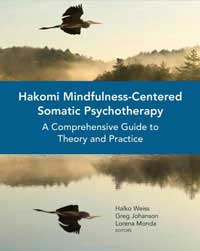 400 pages
400 pages14 CE credits
Course Enrollment
$260.00
Add to Cart
All exams are taken online. The exam for this course will be available in "My Courses" immediately upon enrollment. Note the book is not included.
The book is available for purchase from Amazon.
As an Amazon Associate we receive a rebate from qualifying purchases.
HAKOMI MINDFULNESS-CENTERED SOMATIC PSYCHOTHERAPY
A Comprehensive Guide to Theory and Practice
Halko Weiss, Ph.D, Greg Johanson, Mdiv, Ph.D, and Lorena Monda, MS, Eds.W. W. Norton & Co., 2015
DESCRIPTION
The authoritative text on Hakomi methods, theory, and practice.
Hakomi is an integrative method that combines Western psychology and body-centered techniques with mindfulness principles from Eastern psychology. This book, written and edited by members of the Hakomi Institute–the world's leading professional training program for Hakomi practitioners–and by practitioners and teachers from across the globe, introduces all the processes and practices that therapists need in order to begin to use this method with clients. The authors detail Hakomi's unique integration of body psychotherapy, mindfulness, and the Eastern philosophical principle of non-violence, grounding leading-edge therapeutic technique in an attentiveness to the whole person and their capacity for transformation.
In terms of the Hakomi method of mindfulness in therapy, the reader should be able to:
• Determine the characteristics of the method
• Explain the essential method
• Examine the central role of the body in the use of the method
• Describe the principles of the method
• Explain what is involved in assisted self-study
• Discuss the roles of organizing beliefs when using the method
• Describe the form of character therapy
• Use the method as a therapeutic tool
• Explore what is meant by experimental attitude
• Describe the use of both following and leading in mindfulness
• Make ethical decisions on the use of the method as a tool
• Explain the method of tracking and contact
• Analyze the method's intent to access and deepen
• Determine the method's position on resistance and defenses
• Explain methods with child states and therapeutic regression
AUTHOR
Halko Weiss, Ph.D, is a clinical psychologist and lecturer on mindfulness, couples therapy and body-centered psychotherapy for the Bavarian Licensing Board for Psychotherapists, ZIST Academy, University of Marburg, and the University Hospital in Tuebingen, Germany. Greg Johanson, MDiv, Ph.D, LPC, NCC, a founding trainer of the Hakomi Institute, a member of the American Psychological Association and the American Association of Pastoral Counselors. Lorena Monda, MS, DOM, LPCC, is a practicing psychotherapist and a doctor of oriental medicine.
EDITORIAL REVIEWS"Professional psychotherapists and students alike will find the book highly informative and helpful for learning about and practicing Hakomi psychotherapy. For those who are already interested in the intersection of eastern philosophy, psychology, self construction, meditation, and awareness, it is a highly relevant integrative framework to work with."
--Somatic Psychotherapy Today
"A powerful compendium of Hakomi philosophy and body techniques that wonderfully highlights how fundamentally mindful body work is and has always been well before mindfulness rose to popularity. I highly recommend this to all readers interested in what life is all about and how to make its possibilities realized."
-- Albert Pesso, Author of Experience in Action and Psychomotor Psychology
"This anthology is indeed destined to be a landmark volume, not only in the advancement of the healing arts of Hakomi, but also in the wider fields of somatic psychology and body-mind therapy. The articles presented here are clearly written, deeply thoughtful, and readily accessible to both student and seasoned practitioner. The book comprises a beautiful balance of theory and clinical practice, of philosophical grounding and therapeutic application. In short, this volume is invaluable and one of the top ten 'must read' books for anyone committed to mindfulness and somatic psychotherapy."
--Barnaby B. Barratt, PhD, DHS, Former Professor of Family Medicine, Psychiatry and Behavioral Neurosciences at Wayne State University
"This book has finally arrived! The Hakomi Method is one of the earliest efforts to integrate mindfulness into therapy, beginning in the 1960's. It is a fascinating approach that includes body awareness, investigation of core beliefs, compassionate presence of the therapist, embracing the unconscious, and collaborative investigation. A unique contribution of Hakomi to mindfulness-oriented therapy is the emphasis on exploring the structure of the personal 'self' and the causes of its suffering. This book is comprehensive in every way-historical background, theory, method, interventions, case illustrations, clinical applications-and deserves to be read by anyone seriously interested in psychotherapy and its many wonderful expressions. "
--Christopher Germer, PhD, Clinical Instructor, Harvard Medical School; author of The Mindful Path to Self-Compassion and co-editor of Mindfulness and Psychotherapy
"In reading this volume about Hakomi I find myself thinking that it aims to bring infant multi-level meaning making processes-how infants understand themselves in the world through a simultaneous integration of every level of their being (metabolic, immunologic, physiologic, stress regulatory, emotional, behavioral), which we all still possess-into the co-creative exchange of adults who now have expansive capacities for mindfulness, reflection, and symbolization. It is also working at one and the same time to overcome these adult capacities–tendency for imperialist dominance and constriction of somatic multilevel experience. Thus this book challenges each of us both personally and professionally to try to make meaning of our own changes and therapeutic change processes. Taking on this challenge is more than worth the effort."
--Ed Tronick, PhD, University of Massachusetts Boston, Director of the Infant-Parent Mental Health Program
ISHK CE at Home
1702-L Meridian Ave., #266
San Jose, CA 95125-5586
This website uses cookies to ensure you get the best experience on our website. Learn more
